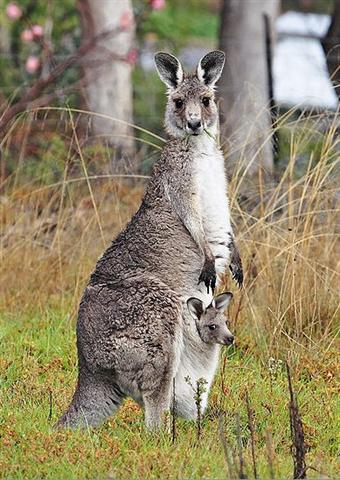6. The name Taga-roa should be of importance for us. Basically it seems to mean 'The Long Sack':
With Tane occupying the front side, in the sunshine (land, ebb, summer), Tagaroa must be on the backside, in the night (sea, flood, winter). In a complete darkness, just as if in a sack. And inside Rumia, his single shell confinement, is the beginning of all. Before light arrives there is complete darkness. The little god was as in 'the shell' of his mother:
Of course it is more easy to depict him inside an egg. And on Easter Island there were no marsupials. Bird eggs were important, though, which is 'proven' by the yearly contests for the first egg of the newly arrived manu tara sooty terns outside the southwestern corner of the island. The etymology of kangaroo is not known, which allows me to imagine a connection with Tagaroa (Kanaloa). The Polynesians surely visited Australia on several occasions and the striking pocket (little sack) on the front side of the man-sized kangaroos (standing on 2 legs just like men), must have stayed in their memories. Nothing on land can be more illustrative of how life must have begun inside a dark sack (taga). The strange name Reitaga for Sirius can possibly be explained from the fact that the ancient Egyptian year began with the rising of the Nile (an event similar to flood, winter, night), and this in turn was caused, it must have been deduced, by the rising of Sirius, the glorious star which did not move. Such a basic concept should have had power enough to be transmitted to the Polynesians. And on Easter Island, south of the equator, the season will be early after winter solstice, which agrees quite well with the position of Ga1-16:
Given, of course, that the beginning of the G text coincides with winter solstice. 43m / 60 = 0.716... and 0.716... / 24 = ca 0.03, and with a 20 * 20 = 400 day long 'egg cycle' 3 % corresponds to 12 days (although the precession of the equinoxes since the text was created possibly should change the number to 13 days):
Vaha mea in Ga1-4 (Saturday) could represent the end of winter solstice. The ariki (king, ruler) glyph type, I have earlier found out, was used in the G text for measuring the distance in days from winter solstice:
Moreover, ariki glyphs apparently were located at the end of glyph sequences. Therefore I have divided 12 above into 9 + 3. With 13 days as the distance also Ga1-5 could be an end glyph, given that we look at the glyphs as pairs (which seems reasonable for the back side of the year):
In Ga1-5 and Ga1-13 the flat back of the king's head, rising upwards, could indicate the solstice, when Sun does not move along a curve any more, and maybe he 'does nothing and dresses richly in a luxurious way' (just like Sirius):
... In the deep night before the image [of Lono] is first seen, there is a Makahiki ceremony called 'splashing-water' (hi'uwai). Kepelino tells of sacred chiefs being carried to the water where the people in their finery are bathing; in the excitement created by the beauty of their attire, 'one person was attracted to another, and the result', says this convert to Catholicism, 'was by no means good' ... |
|||||||||||||||||||||||||||||||||||||||||||||||||||||||||||||||||||||||||||||||||||||||






